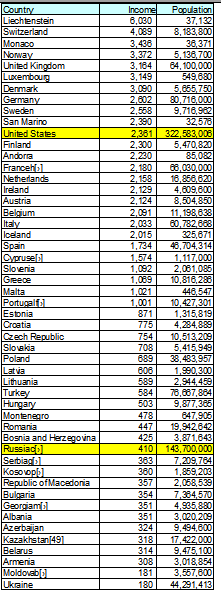And that is good? Living with your parents and working two full-time jobs for several years just to pay for your university degree? Europeans would call this a horror story. Europeans pay some taxes, yes, but not much more than Americans, yet they pay next to nothing for themselves, their spouse and their kids when it comes to health care or education.
If the guy you mention had been born in France, Spain, Finland, Italy, Ireland, or wherever, he would have paid a few hundred euros per year for his studies (maybe a few thousand, if his parents were really rich) and he would not have had to take a McJob before, during or after their studies. The time many American students spend working, European ones spend at scout groups, sports clubs or other non-profit organizations. Or just having fun.
Though I'm the first to admit that Europe is also becoming poorer and poorer each day.
Let's be fair. American ethnic diversity saw much poverty that you're excising from your carefully chosen European countries. If you truly included all Europe, especially to the population level of the U.S., your comparison would quickly fall apart.
Sure, a handful of Northern and Western Europeans with a negative birth rate see higher standards of living, but as economies force the importation of labor, each sees issues similar to what America has. We could easily slice and dice America into rich and poor zones and exclude the poor states as outliers the way Europeans treat their poorer regions as atypical.
But I guess you'll agree that it's certainly not a law of nature that a MSc or the like would automatically provide a six-figure income.
It's much more likely that a young person with a six-figure income is having the right genes, and by that I mean: relatives who did help to find the right job.
None of it is a law of nature, but anyone capable of earning a degree using higher sciences or maths predictably has career options beyond teaching high school math.
But, systemic trends or no, all students are to some degree culpable for choices they make and the need to redirect when it becomes necessary. The rat maze doesn't favor the lazy or the stupid, and college degrees are not withheld from either.
In the EU, it is illegal to pay an intern anything less than any other employee doing the same task. I really don't understand why Americans put up with the idea of working for free. Doesn't it go against all of your priniciples?
This seems to be reaching almost mythical proportions. How many jobs out of how many are unpaid internships? We had seven interns here two summers ago at my company, and it employs around 200,000 worldwide. None of them were unpaid, and none of them were living at home -- all had apartments (on-campus mostly), but were from distant schools.
Just because some professions are using unpaid interns doesn't mean it's the dominant mode. What do the stats say?
It's not fair to get on the soap box about it if it is the exception rather than the rule.
I recall being 17 and trying to choose an education.
There was a lot of misinformation, from politicians especially who wanted an excess of science grads, in a country with few science jobs.
Blaming each individual misses the point if they're being told to train for careers that the country might desire, but companies do not.
Non-essential (to the country) careers, like accounting, turned out to be more lucrative for the individual.
Starting your career with more than $100k in student loan debt and high youth unemployment is a recipe for compounding financial stress.
I don't find "blaming" a fair characterization. Responsible. Accountable.
Fat people may have been ignorant of good nutrition when they were kids, and they may not. But if they have a fat problem, they are ultimately responsible, not the maker of Cheetos, not the TV station that aired the commercials, and not the USDA that allowed corn starch to become an ingredient in myriad products.
Careers aren't like sex changes, irreversible. They happen every day, and change as the person makes those decisions. Those who work at McDonald's may have to figure out how to change the direction with night courses, GED, whatever the next step is.
When I changed course, I went through manual labor jobs at a factory, and it took courses and years to change course. I lived in cheap rentals and bought old furniture and worked one year after another to make small improvements, and eked by with credit debt until I could make a living wage. And I had no middle class family to help me along.
It takes struggle. It's not a level playing field, but we are not hapless victims either.



